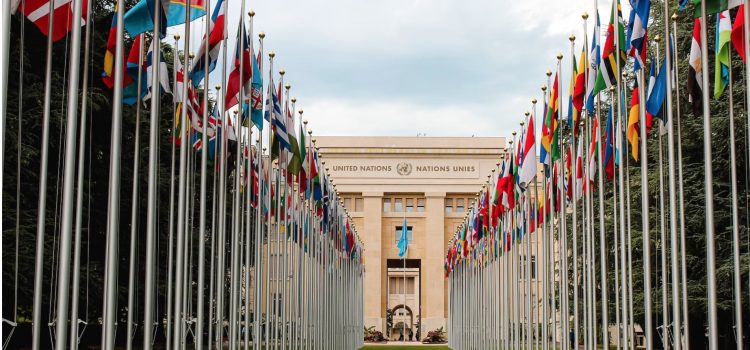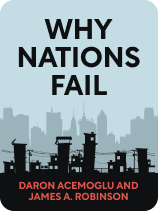

This article is an excerpt from the Shortform book guide to "Why Nations Fail" by Daron Acemoglu and James A. Robinson. Shortform has the world's best summaries and analyses of books you should be reading.
Like this article? Sign up for a free trial here.
What makes a country successful? What do successful countries do differently than failing nations?
In the book Why Nations Fail, economist Daron Acemoglu and political scientist James A. Robinson explain why some nations have wealth and high standards of living while others struggle with poverty and instability. They argue that freedom and fairness in a nation’s economy and government are the answer.
Keep reading to learn the two reasons why successful countries thrive, according to Acemoglu and Robinson.
Why Do Countries Succeed?
In How Nations Fail, economist Daron Acemoglu and political scientist James A. Robinson outline their theory for the cause of international inequality and how successful countries operate differently than failing nations. They believe that to understand inequality, one must study a nation’s political and economic institutions:
- Political institutions determine how a nation creates the rules that citizens live under. They also determine who wields power in society and how they wield it. Examples of open political institutions include a system of free and fair elections, town halls, courts, and legislatures.
- Economic institutions are the laws and incentives that influence how people behave in the market for labor, goods, and services. They determine the processes that distribute resources. Examples of economic institutions include banks, the stock market, and patent laws.
Political institutions necessarily determine economic institutions, argue the authors. This is because political institutions determine how rules are made—including the rules that govern economic institutions.
(Shortform note: The relationship between political and economic institutions is the subject of a long-running debate. Some, like Acemoglu and Robinson, argue that political institutions mainly influence economic institutions. Other scholars, however, suggest that economic institutions mainly influence political ones—for example, one scholar argues that the lifespan of a democracy depends on its per-capita income, where higher per-capita income leads to longer-lasting (or even indefinitely-lasting) democratic governments. As you read through the discussions of political and economic institutions below, consider the following question: Does one influence the other more?)
Acemoglu and Robinson argue that inequality comes from different levels of institutional “openness”: freedom for citizens to participate in these political and economic institutions. The more open a country is, the more successful it will be, while less open countries fail.
#1: Open Political Institutions
In explaining how open political institutions drive a country to succeed, the authors provide two main standards a political institution must meet for it to be considered open:
1) Pluralism: A pluralistic institution creates limits on its own power and gives political power to the population at large. Pluralism is necessary for open political institutions because it not only gives power to the populace but also ensures that the government can’t take that power away. For example, a free and fair election is pluralistic because it allows everyone in society to exercise political power by voting. There are also limits on what a pluralistic election can accomplish—a constitution might guarantee certain rights that even an election result or elected official can’t get rid of, like a right to free speech.
2) Consistent enforcement: A successful country also needs the power to consistently enforce the rules and limits of political institutions. Consistent enforcement is necessary for open institutions because it ensures that those in power will actually respect and follow the rules of political institutions. For example, if a country with open institutions has a president who refuses to give up power, some kind of enforcement (like the military, federal police, or the judiciary) will step in and remove that president—upholding the rules of the nation’s open political institutions.
(Shortform note: While Acemoglu and Robinson emphasize the importance of written concrete rules enforced by a central power, the authors of How Democracies Die argue that unwritten rules on political conduct are equally (if not more) important for maintaining democratic (and therefore open) political institutions. They claim that written rules alone can’t constrain bad-faith politicians who are willing to cheat and bend the rules to win by any means necessary. These rules will always have some kind of exploitable loophole, specific interpretation, or vague wording. Therefore, unwritten rules and political norms must exist to punish bad-faith politicians and ensure that everyone respects the letter of the law as well as the intent behind it.)
#2: Open Economic Institutions
Under open political institutions, the population at large can use their political power to protect their economic interests. To do so, they can make open economic institutions: rules and services that create an open market that’s free, fair, and provides opportunities to all. Countries are successful under open economic institutions because people can spend (or keep) their money as they wish, pick the jobs they want, and have opportunities for entrepreneurship if they so choose. Both rules and services are crucial for this:
Rules
Rules that control market activity are necessary to ensure free participation, fair and honest conduct, and an accessible market. These rules include, but aren’t limited to, strong property rights, enforcement of contracts, prevention of fraud, and splitting up monopolies. For example, laws that enable a government to split up a monopoly ensure that one large business won’t deprive smaller businesses of opportunities or limit the freedom of consumers to choose who they buy from.
(Shortform note: William Easterly (The White Man’s Burden) argues that rules and regulations aren’t enough to run an open market—there also must be a culture of trust, especially trust between strangers. Trust is crucial for a free market economy, since people won’t do business with others if they think they’ll get ripped off. Therefore, simply having written rules and regulations may not be enough to ensure a free and fair market.)
Services
In addition to rules, open economic institutions also must provide tangible public services like roads and schools to make a country successful. These public services provide opportunities to a large variety of citizens, helping to create a fair (and therefore open) market. Without them, opportunities might only be available to the wealthy or to those in certain areas. For example, public schools allow all citizens to get an education. Education provides skills used in developing new technologies, running businesses, or performing higher-skilled labor. Without public schools, these skills might only be available to those who can afford private education.
(Shortform note: While Acemoglu and Robinson suggest that public services enable a free and fair market, Milton Friedman (Capitalism and Freedom) argues that public services can actually limit freedom by creating government-owned monopolies. He uses public schools as an example: Public schools restrict the choices of parents by assigning children to a particular school based on location. And no matter what school they go to, they learn a government-approved curriculum through government-approved educational methods—and neither the parents nor the children have any say in the matter.)
Why Open Institutions Lead to Success
Acemoglu and Robinson offer two main reasons why open institutions make a country successful:
1) Encouraging productivity: Open institutions encourage citizens to be more productive and create more wealth. This is because they give citizens personal incentives to do so—under open institutions, citizens know that the wealth they create is secure and that they can use it on whatever they want. In addition, citizens can choose the job that best suits their skills, allowing them to do better and more productive work.
2) Encouraging new ideas: Open institutions also encourage new ideas and technological developments. Opportunities for entrepreneurship allow citizens to develop new technologies and give them a personal incentive for doing so (money). Then, other citizens (who, like the entrepreneurs, can spend their money as they choose) will gravitate toward the best ideas. This gives both entrepreneurs and consumers personal incentives for technological development. Technological development is crucial for success, argue Acemoglu and Robinson. Historical examples like England’s early adoption of the steam engine or Japan’s tech boom in the 1970s show that being on the technological cutting edge creates lots of wealth.
| Success Versus Internal Inequality Acemoglu and Robinson suggest that inequality between nations correlates with technological development—nations that adopt new technologies grow wealthy, while nations that reject them fall behind. However, some experts argue that new technology also creates inequality within a nation by benefiting the wealthy much more than the poor. From this perspective, one could argue that technological development doesn’t go hand in hand with openness—it actually concentrates wealth further instead of distributing it across the population at large. Some economists suggest that internal inequality also decreases worker productivity—so if technology does concentrate wealth, then it wouldn’t exist simultaneously with higher productivity. However, one could also argue that internal inequality comes from exclusive economic policy designed to benefit the wealthy rather than being an inherent part of technological advancement. |

———End of Preview———
Like what you just read? Read the rest of the world's best book summary and analysis of Daron Acemoglu and James A. Robinson's "Why Nations Fail" at Shortform.
Here's what you'll find in our full Why Nations Fail summary:
- Why some nations have wealth while others struggle with poverty
- Why open nations thrive and exclusive nations typically fail
- How and why some nations change over time






